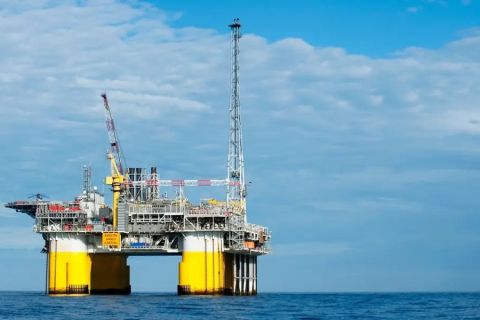
The Biden administration seeks more supply while also “talking about how this industry needs to go away within a very short period of time,” which Sommers said on a July 14 media call, “doesn’t unlock the kind of investment we need to have if we’re going to continue growing production and advancing this moving forward.” (Source: Shutterstock.com)
American Petroleum Institute (API) President and CEO Mike Sommers believes U.S. energy producers are ready to boost supply to address inflation concerns but said the country lacks “a comprehensive energy policy that lays the foundation for long-term growth.”
Global energy markets have been rattled by Russia’s invasion in Ukraine, leading to growing energy supply concerns, higher inflation and soaring energy costs. In response to the turmoil, the Biden administration has accused the U.S. oil and gas industry of profiting from record-high gasoline prices instead of boosting supply.
“We want to work with the administration about refining solutions which could potentially include allowing winter blends during summer months or some targeted Jones Acts waivers to get needed fuel to the east coast market.”—Mike Sommers, API
“Energy alone comprises nearly half of today’s inflation numbers. So, here’s what's important: the price of gas has decreased for 30 days straight, the price at the pump has dropped by 40 cents since mid-June. Gas should continue to come down in the days and weeks ahead,” U.S. President Joe Biden wrote in a Twitter post on July 14.
Biden this week embarked on a trip to the Middle East where he is expected to seek increased oil supply from OPEC, including Saudi Arabia, to help further lower high gasoline prices.
Ahead of Biden’s visit to the Gulf State, Sommers argued that API is working with the administration and Congress to enact its 10-point plan to restore U.S. energy leadership and “immediately to lower prices and secure American energy security.” However, Sommers has been met with mixed messages from the administration, which he said during a media call on July 14 was his key concern.
The Biden administration seeks more supply while also “talking about how this industry needs to go away within a very short period of time,” which Sommers said, “doesn’t unlock the kind of investment we need to have if we’re going to continue growing production and advancing this moving forward.”

10 in 2022
API’s 10-point plan, dubbed “10 in 2022”, addresses issues that support energy investment. Key points include lifting development restrictions on federal lands and waters, fixing the National Environmental Policy Act permitting process, accelerating LNG exports and approving pending LNG applications and dismantling supply chain bottlenecks, among others, according to details on its website.
Sommers suggested Biden visit key U.S. basins to send a signal to American producers that his administration is focused on supporting the domestic oil and gas industry. “Unfortunately, from the beginning of this administration, they have embraced policies that would discourage continued production in the U.S.,” he said while raising concerns about the possibility of zero lease sales in the Gulf of Mexico.
Frank J. Macchiarola, API’s senior vice president of policy, economics and regulatory, added, “The [Biden] administration needs to view this not just from a one-month or two-month lens but from a long-term perspective which is we’re going to need oil and gas for the long-term.”
Geopolitical events this year show that “volatility will increase if you disrupt the global market, and the decision to restrict exports would do just that,” Macchiarola continued.
Refinery Crunch
U.S. refineries are running at record high levels at about 94% compared to 80% in previous years. Many U.S. refineries have put off scheduled maintenance to meet market demands, but around 11 refineries are down compared to pre-pandemic times and some that even converted to refining other types of fuel like biodiesel, Sommers said, adding these issues have led to “the current refinery crunch.”
“The [Biden] administration needs to view this not just from a one-month or two-month lens but from a long-term perspective which is we’re going to need oil and gas for the long-term.”—Frank J. Macchiarola, API
“We want to work with the administration about refining solutions which could potentially include allowing winter blends during summer months or some targeted Jones Acts waivers to get needed fuel to the east coast market,” he said.
Sommers and Macchiarola didn’t address climate change concerns or the industry-wide decarbonization push during the call on July 14 nor expand on what part renewable energies would play in API’s 10-point plan.
Recommended Reading
Geothermal ‘Could Save the World,’ but Faces Familiar Subsurface Risks
2024-03-20 - CERAWeek panelists discussed hurdles to widespread use of Earth’s heat to generate power — problems familiar to oil and gas operators.
Defeating the ‘Four Horsemen’ of Flow Assurance
2024-04-18 - Service companies combine processes and techniques to mitigate the impact of paraffin, asphaltenes, hydrates and scale on production—and keep the cash flowing.
TGS, SLB to Conduct Engagement Phase 5 in GoM
2024-02-05 - TGS and SLB’s seventh program within the joint venture involves the acquisition of 157 Outer Continental Shelf blocks.
2023-2025 Subsea Tieback Round-Up
2024-02-06 - Here's a look at subsea tieback projects across the globe. The first in a two-part series, this report highlights some of the subsea tiebacks scheduled to be online by 2025.
StimStixx, Hunting Titan Partner on Well Perforation, Acidizing
2024-02-07 - The strategic partnership between StimStixx Technologies and Hunting Titan will increase well treatments and reduce costs, the companies said.






